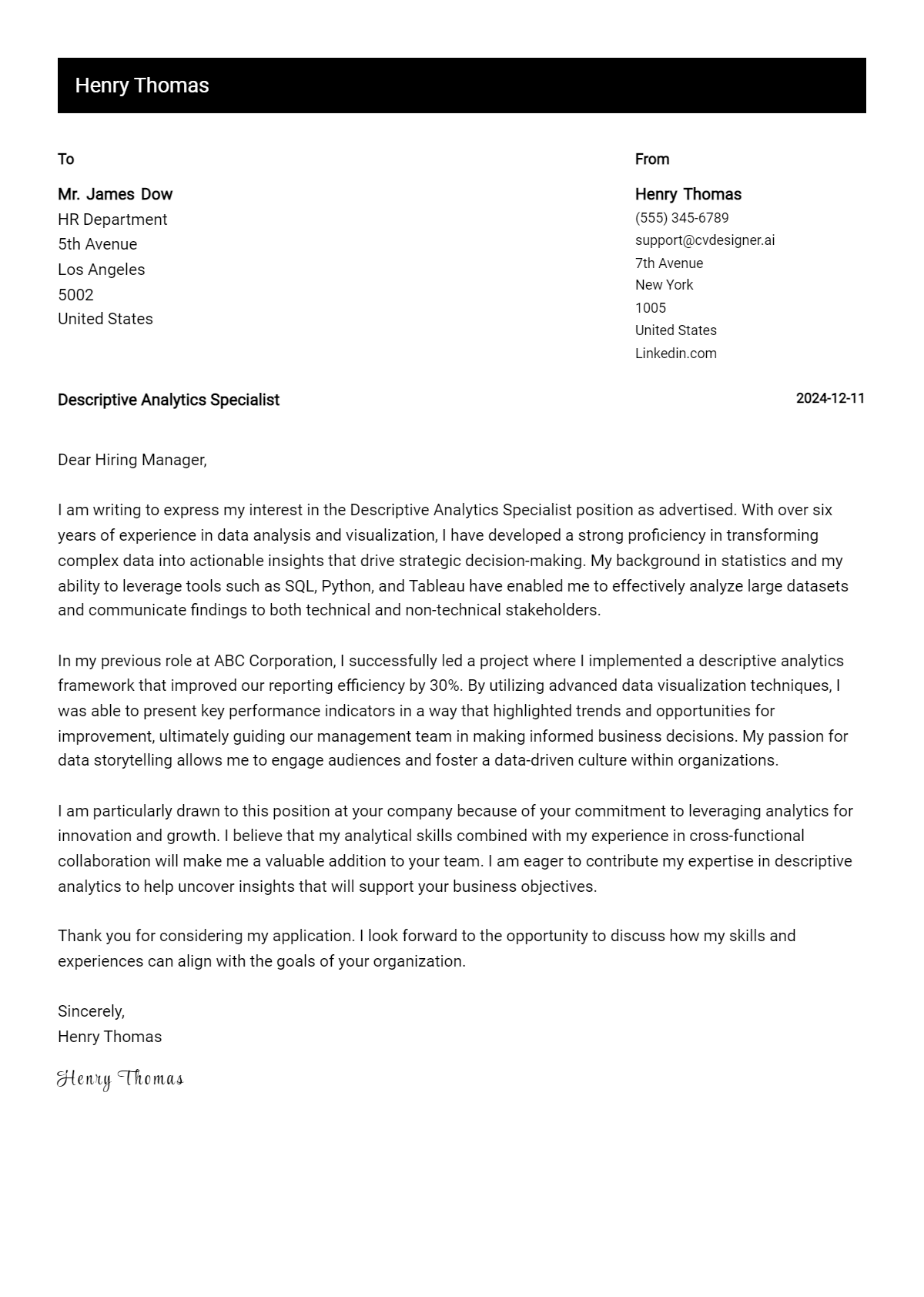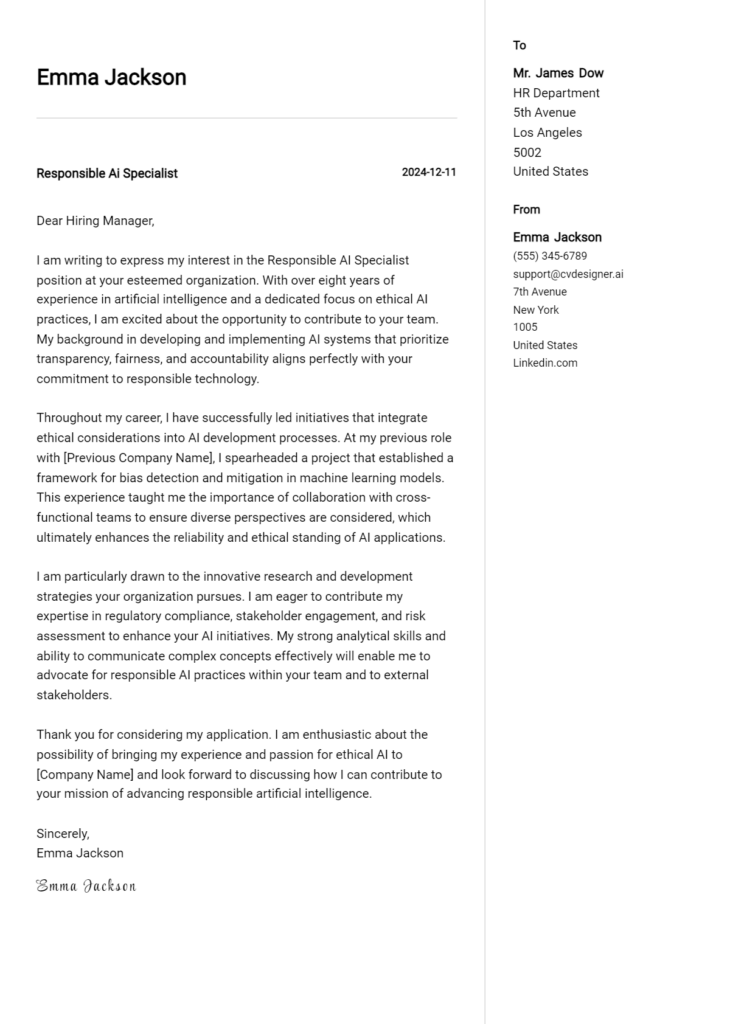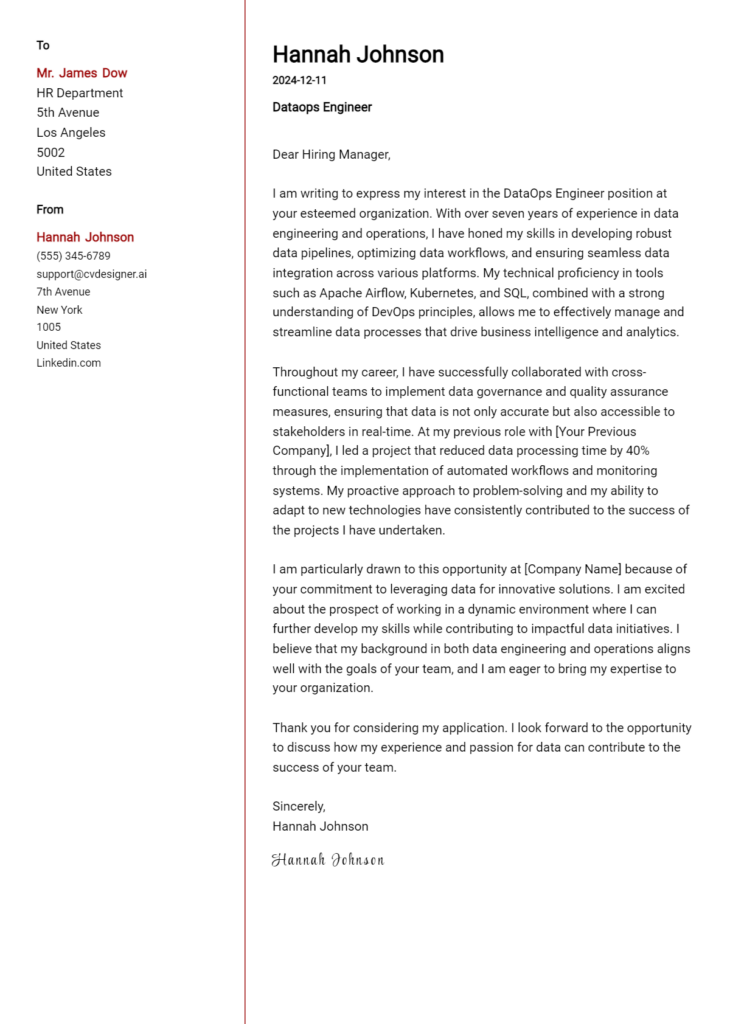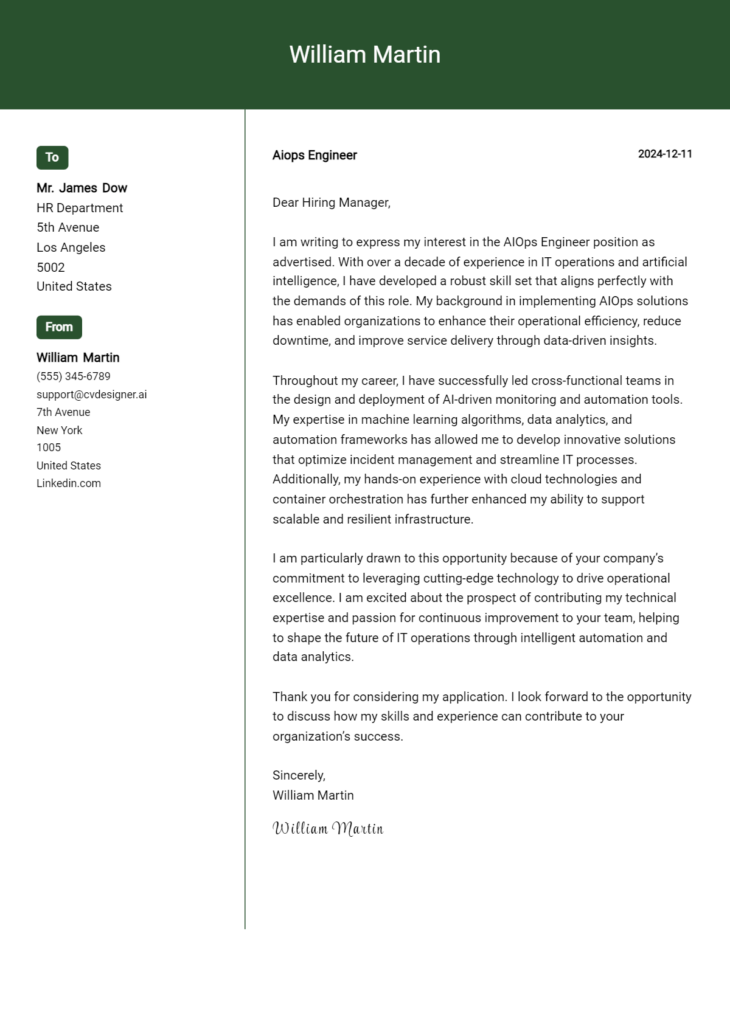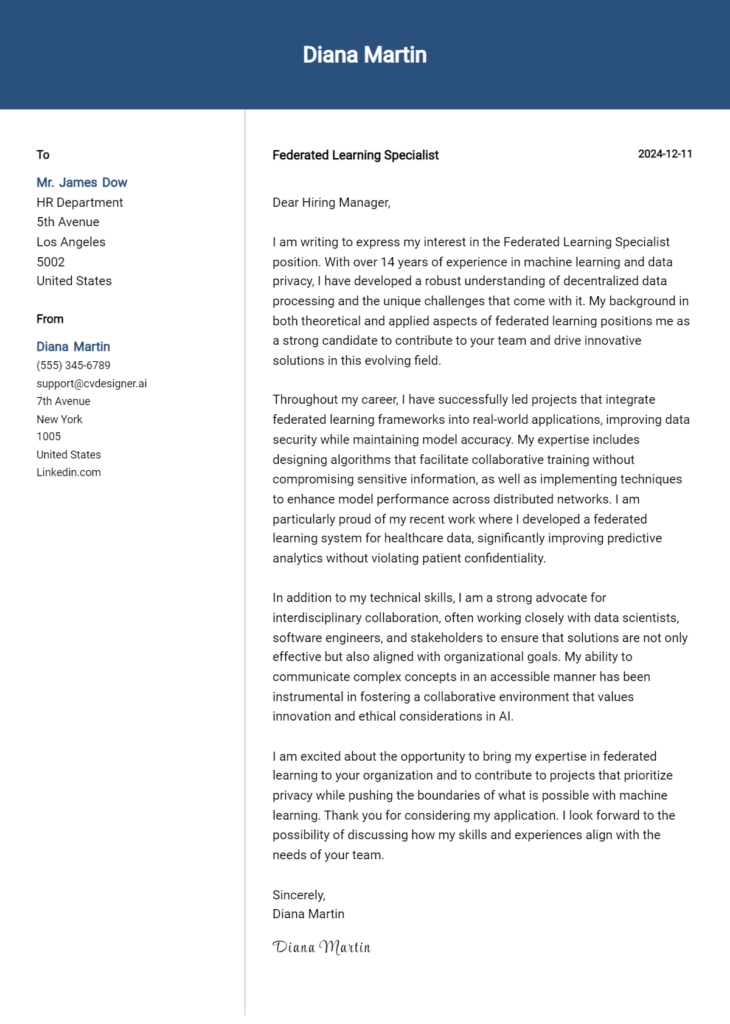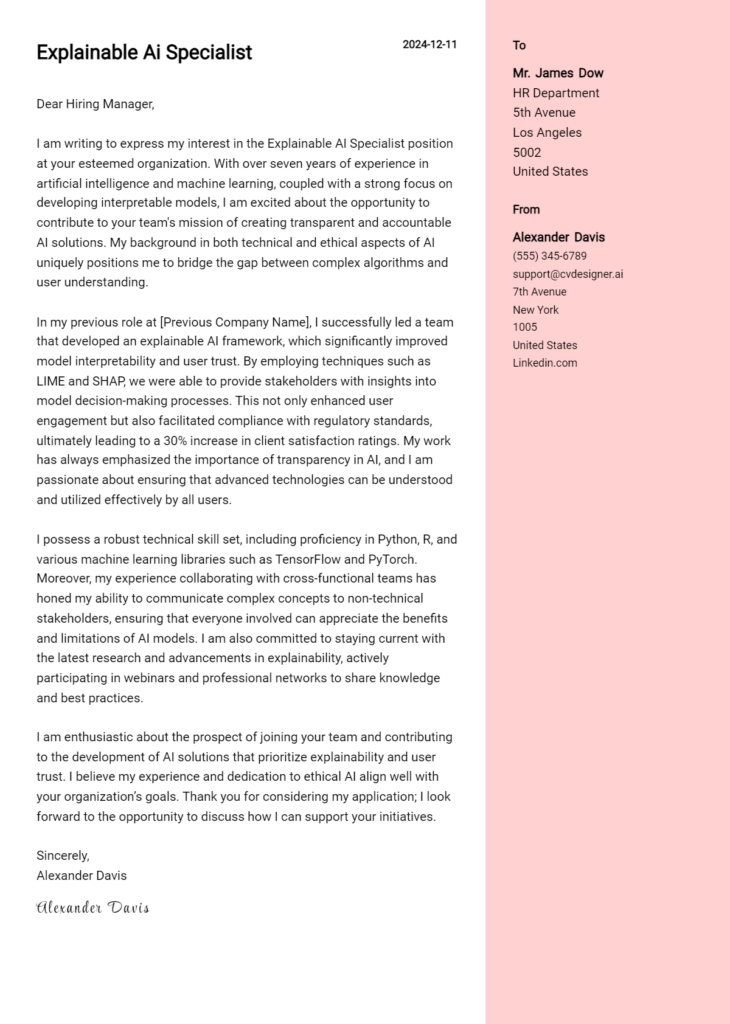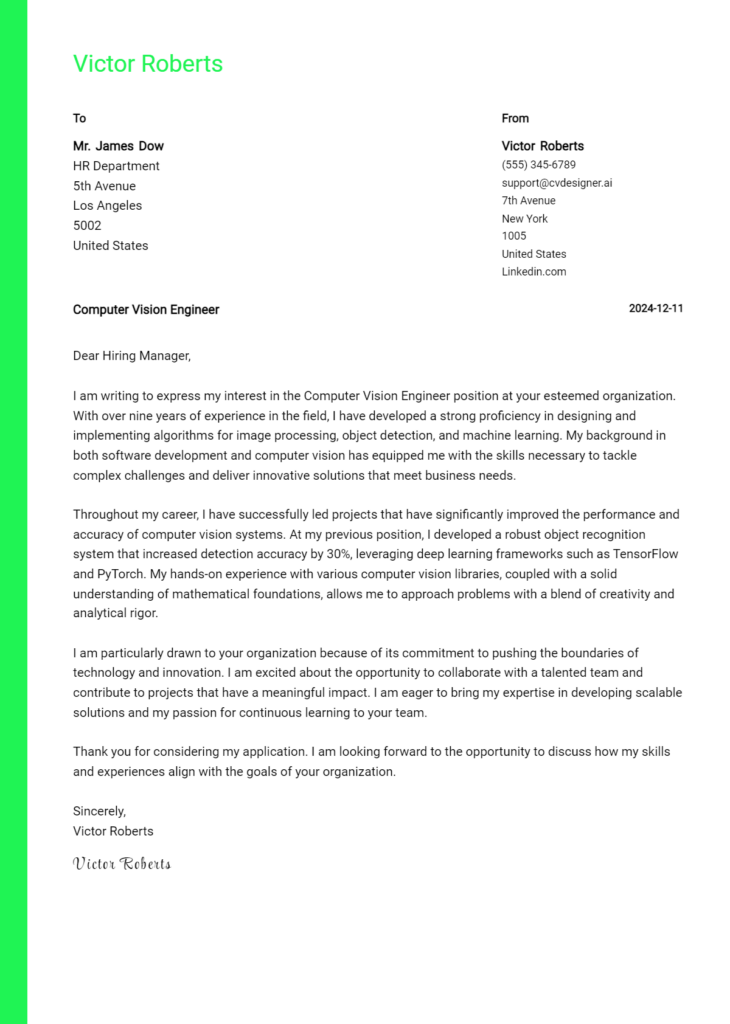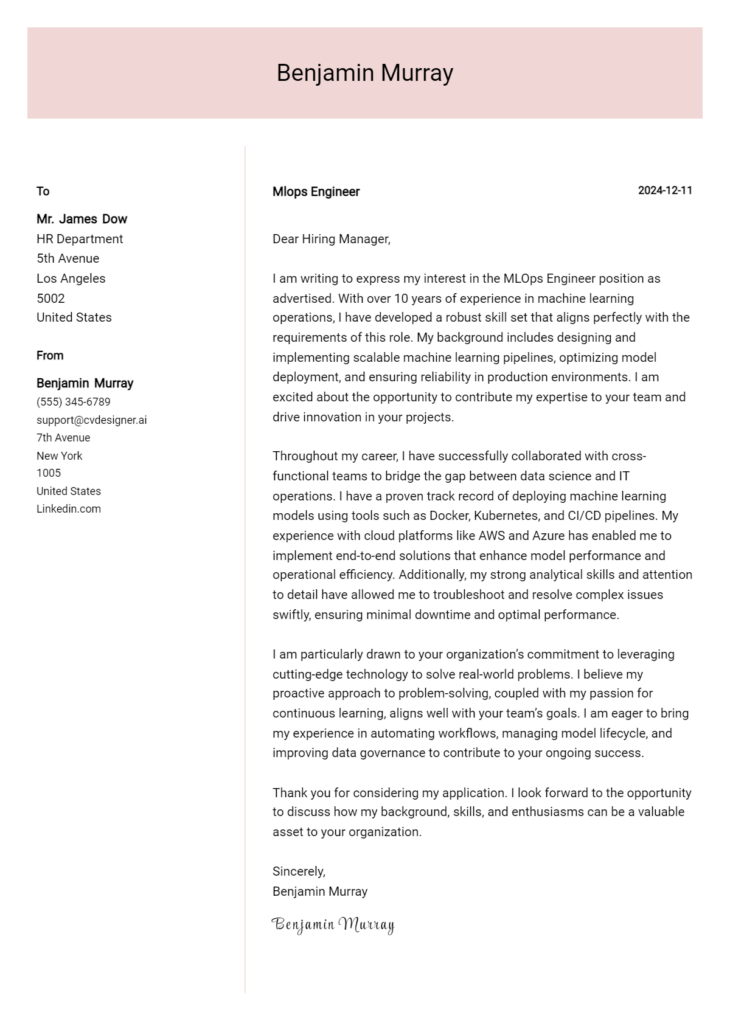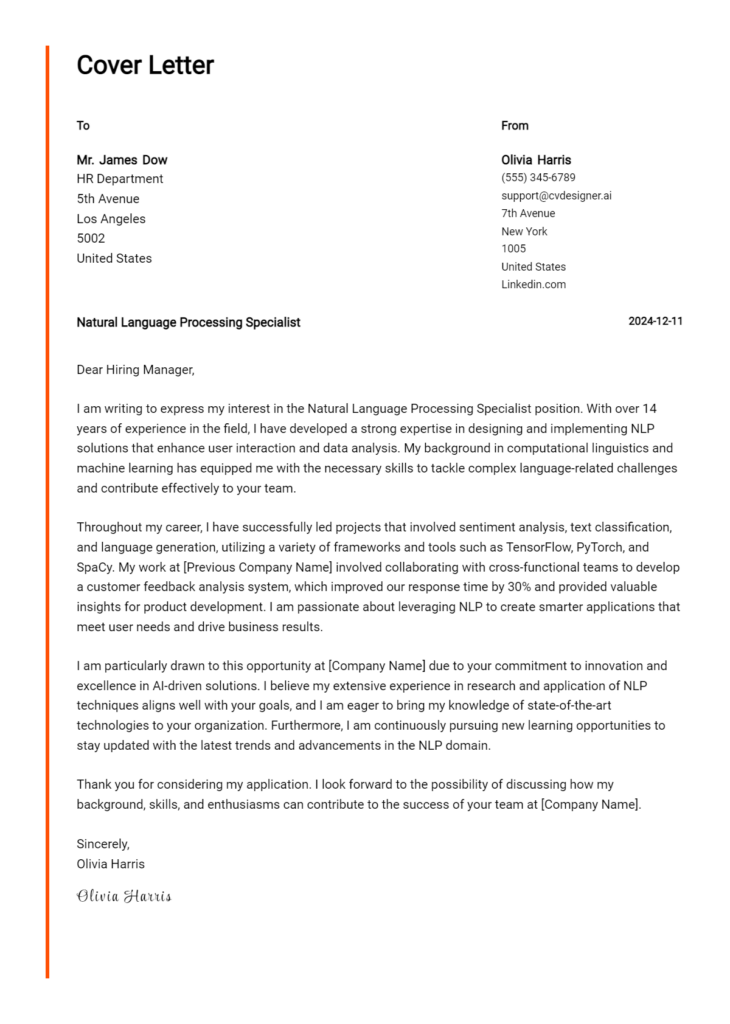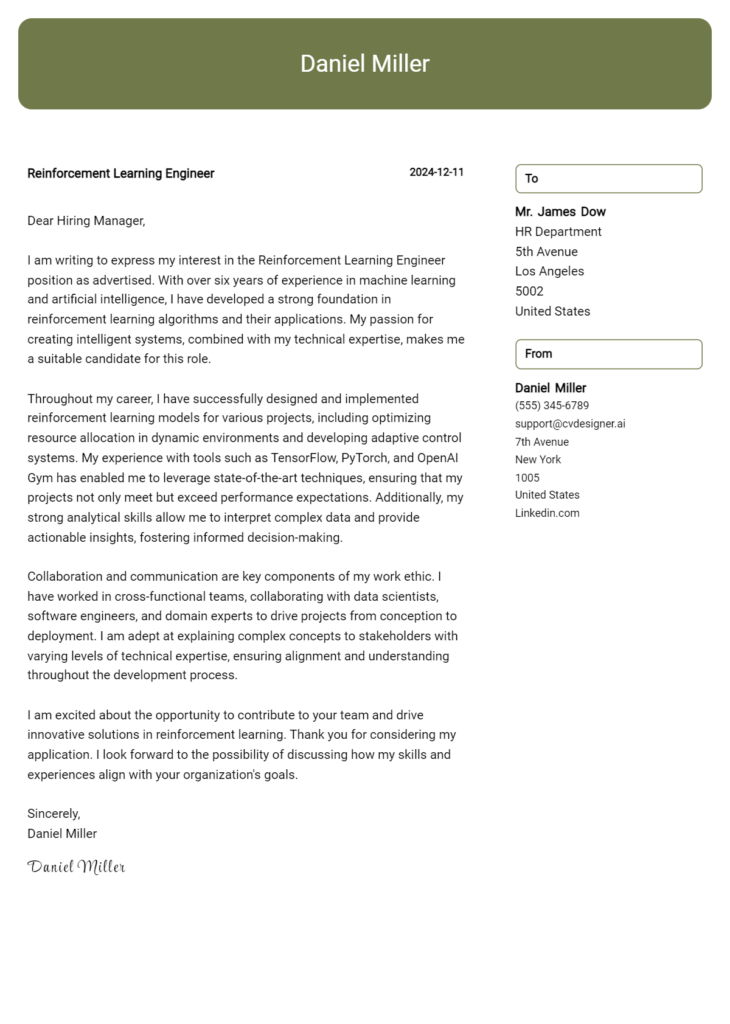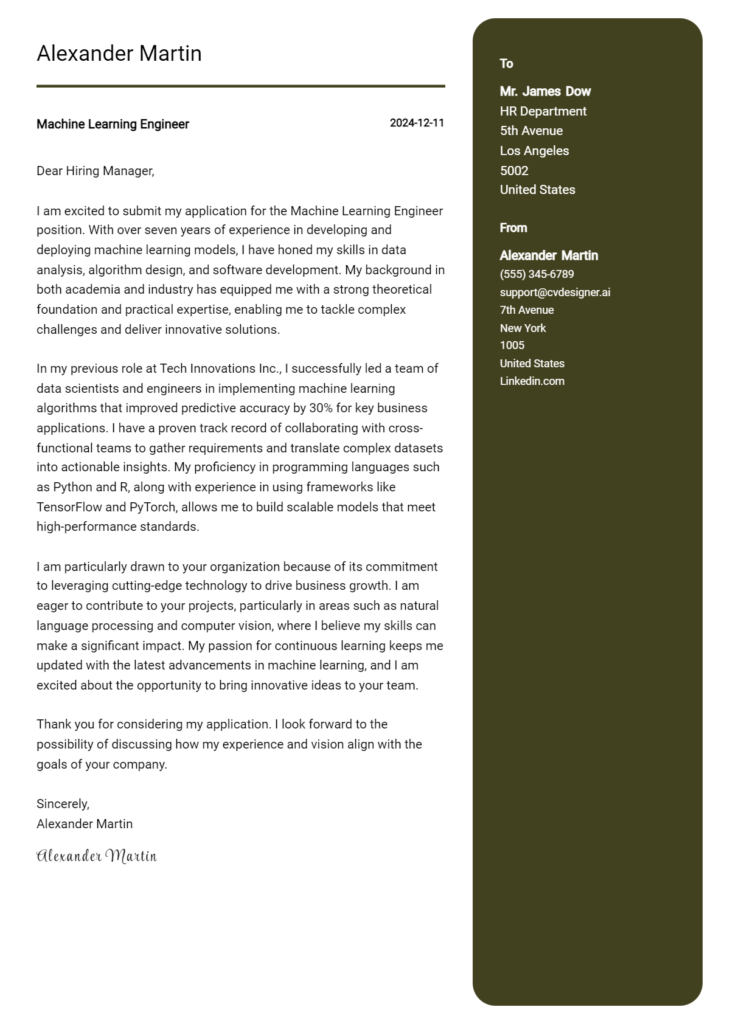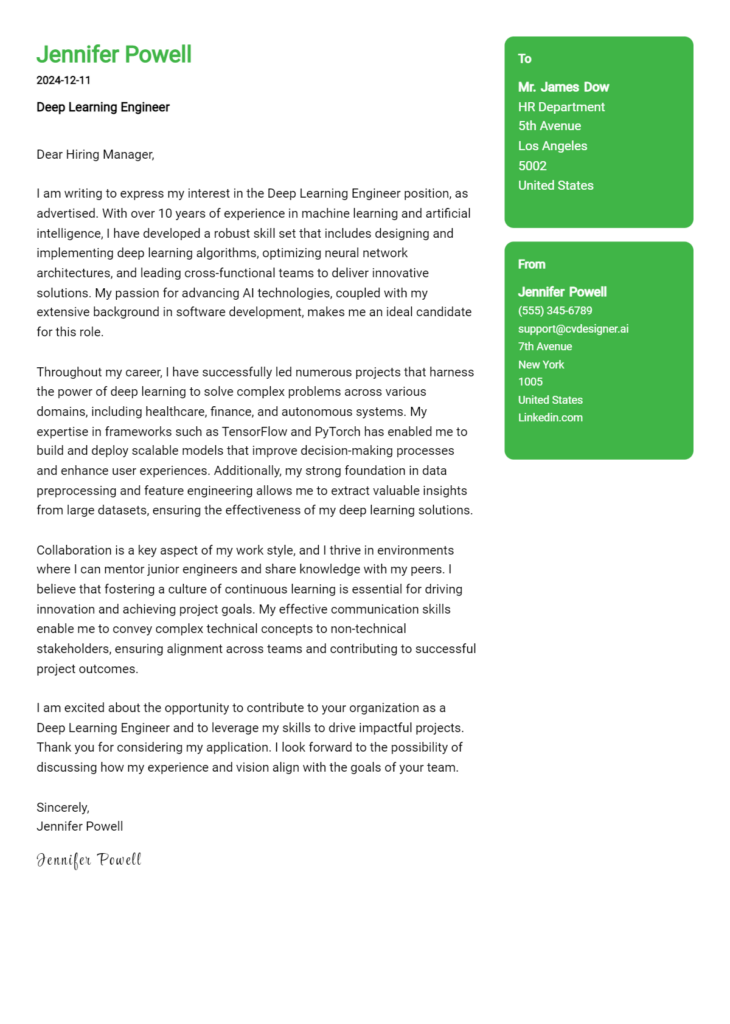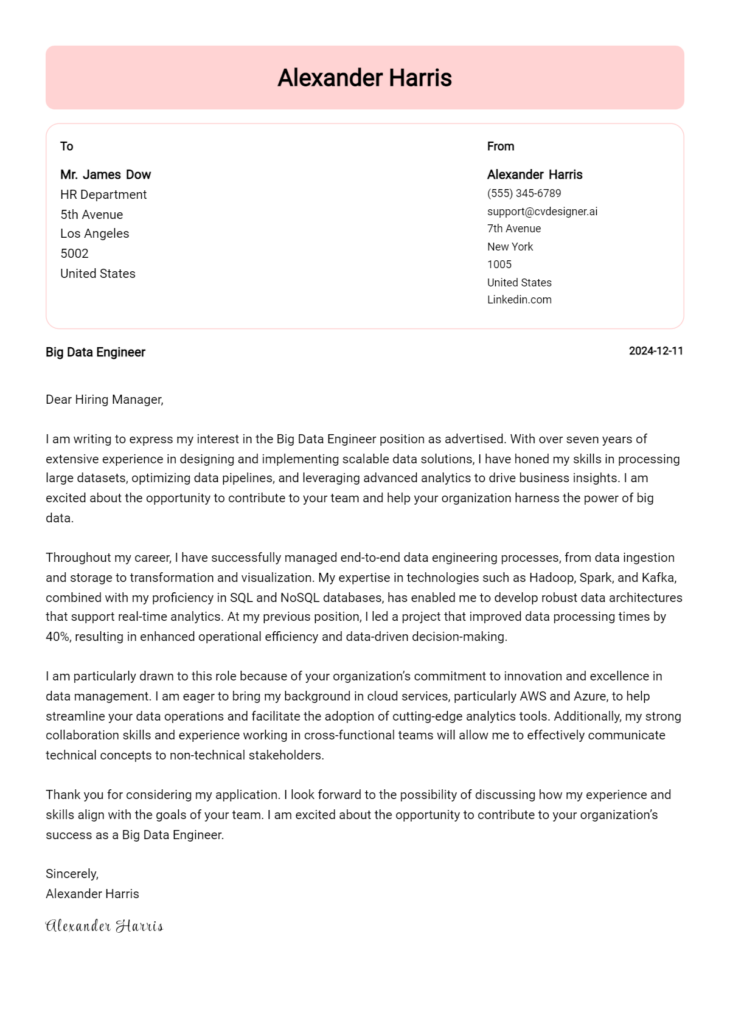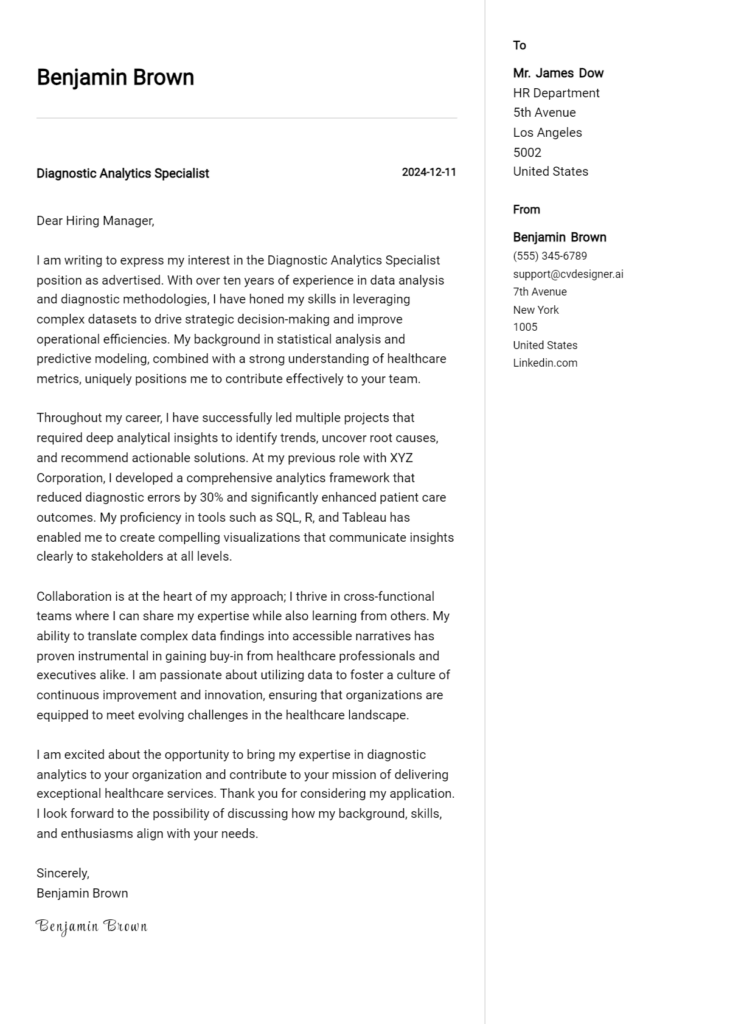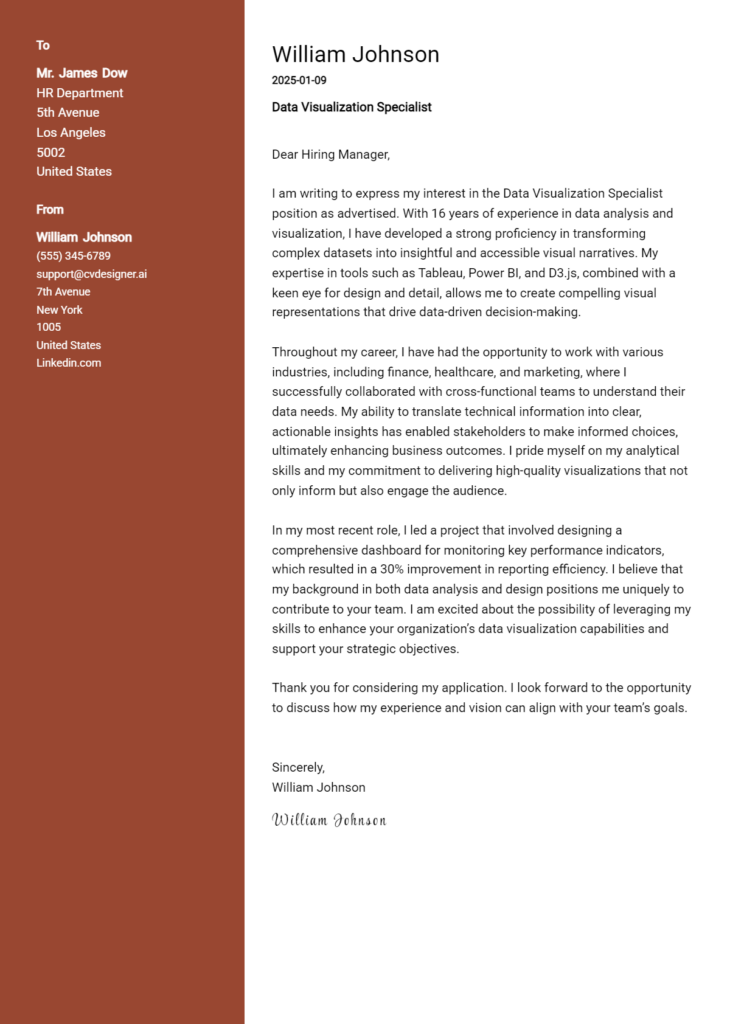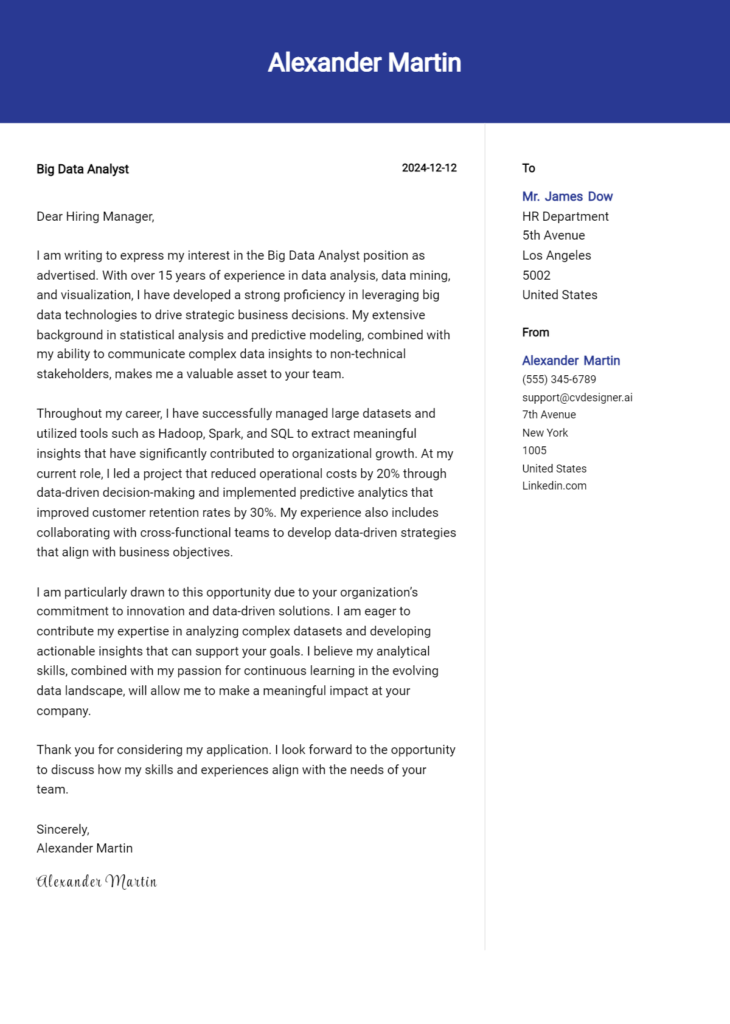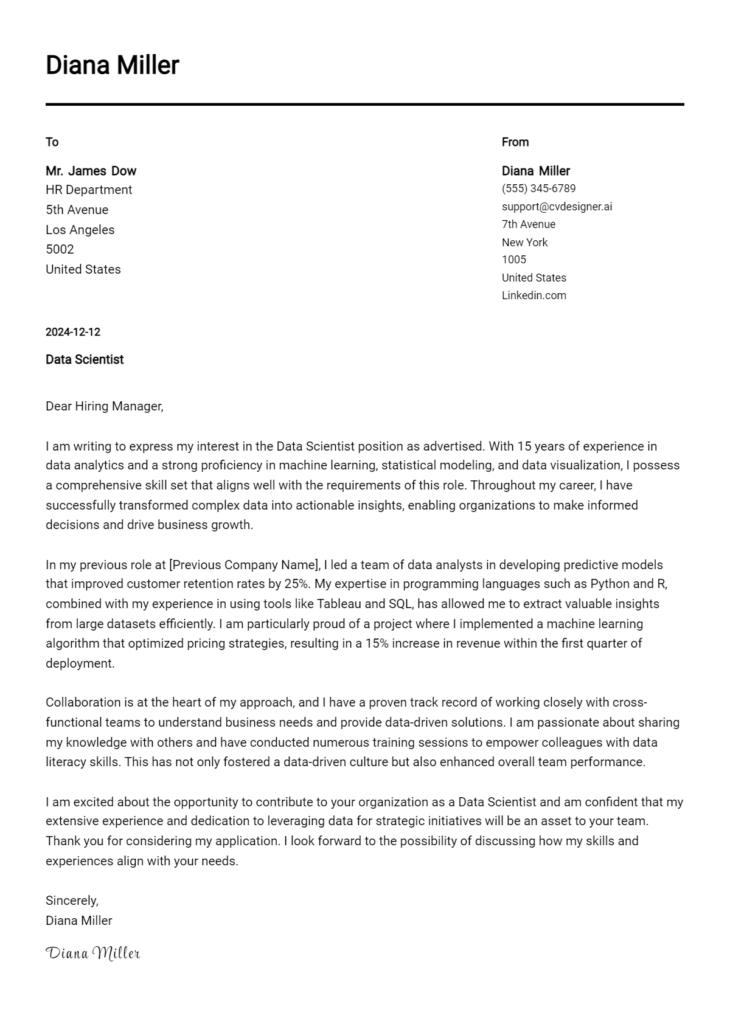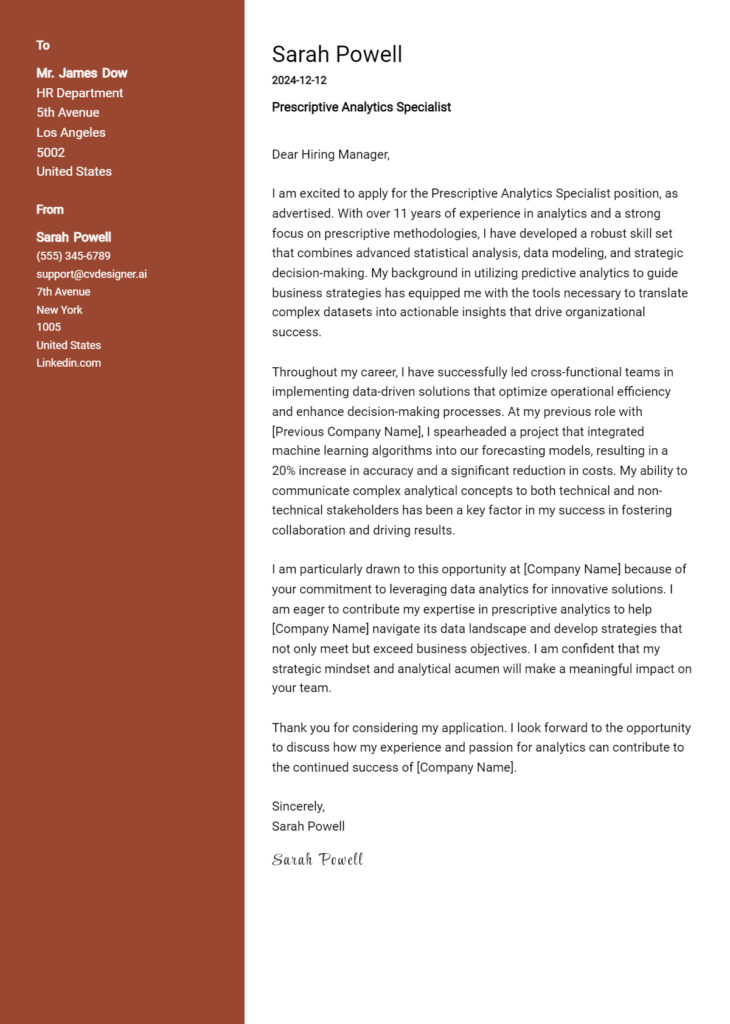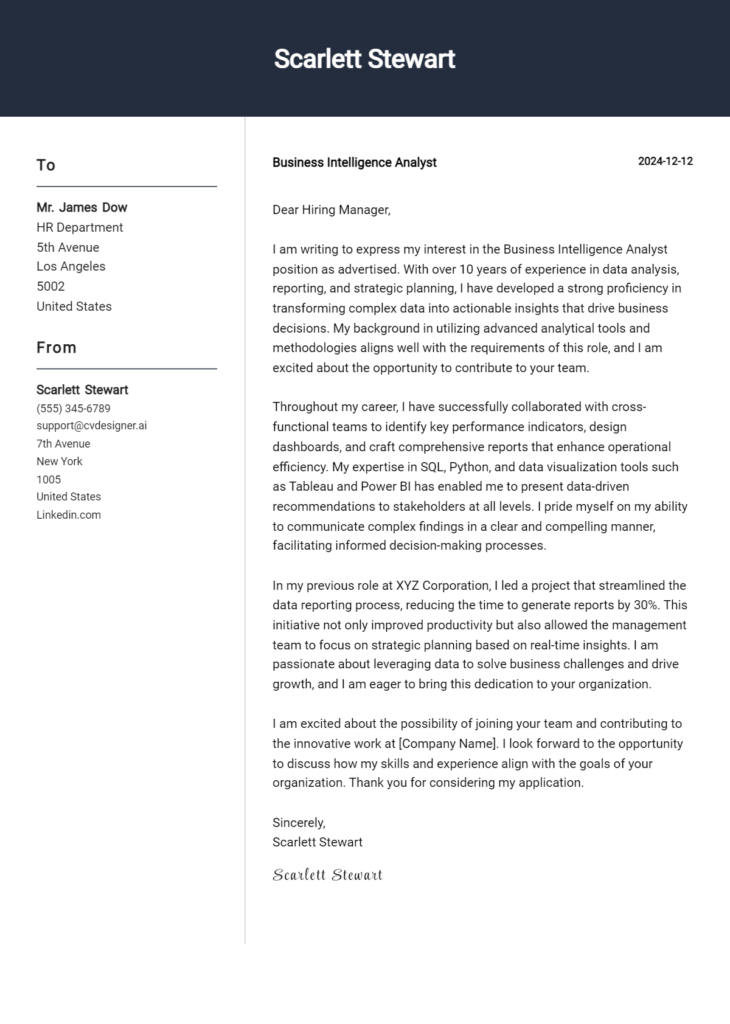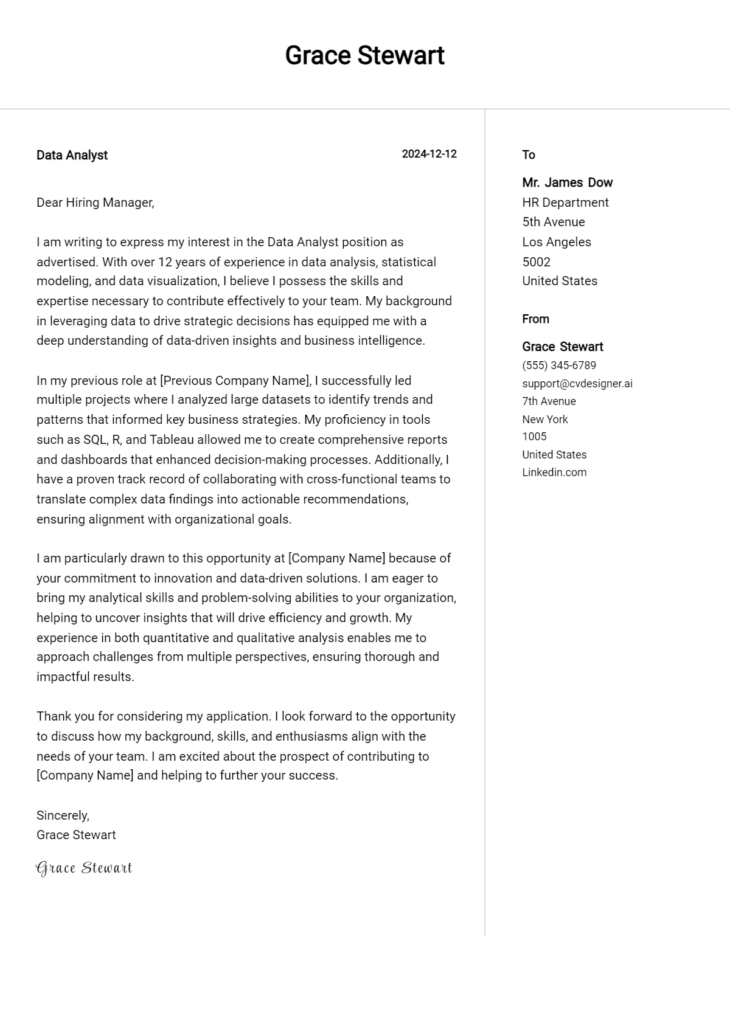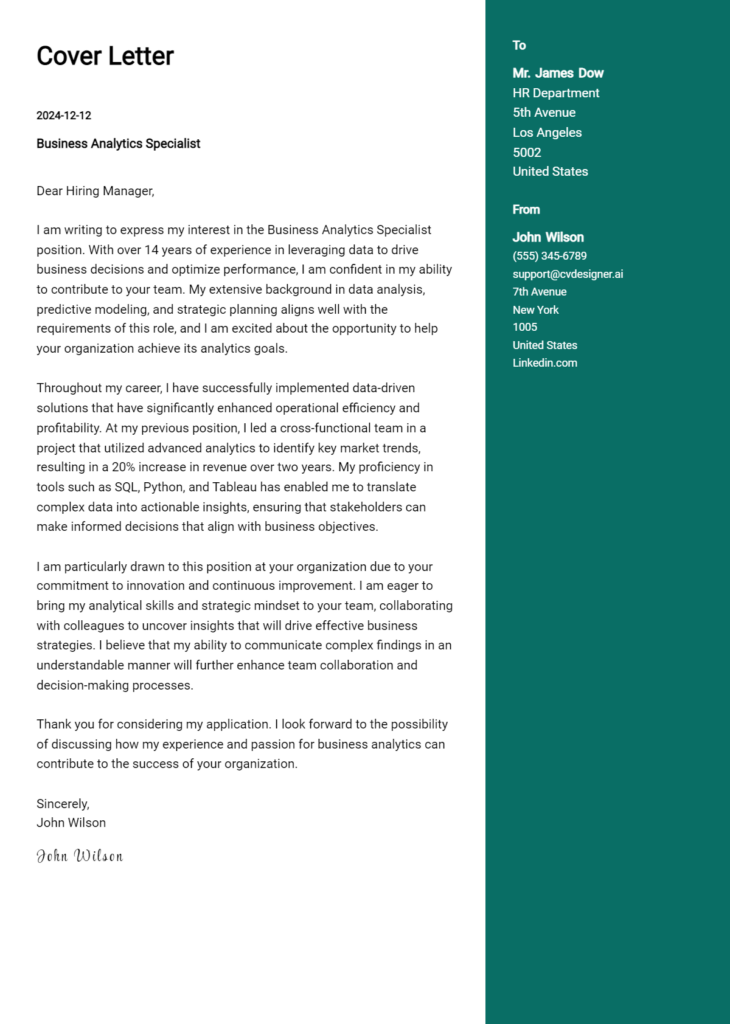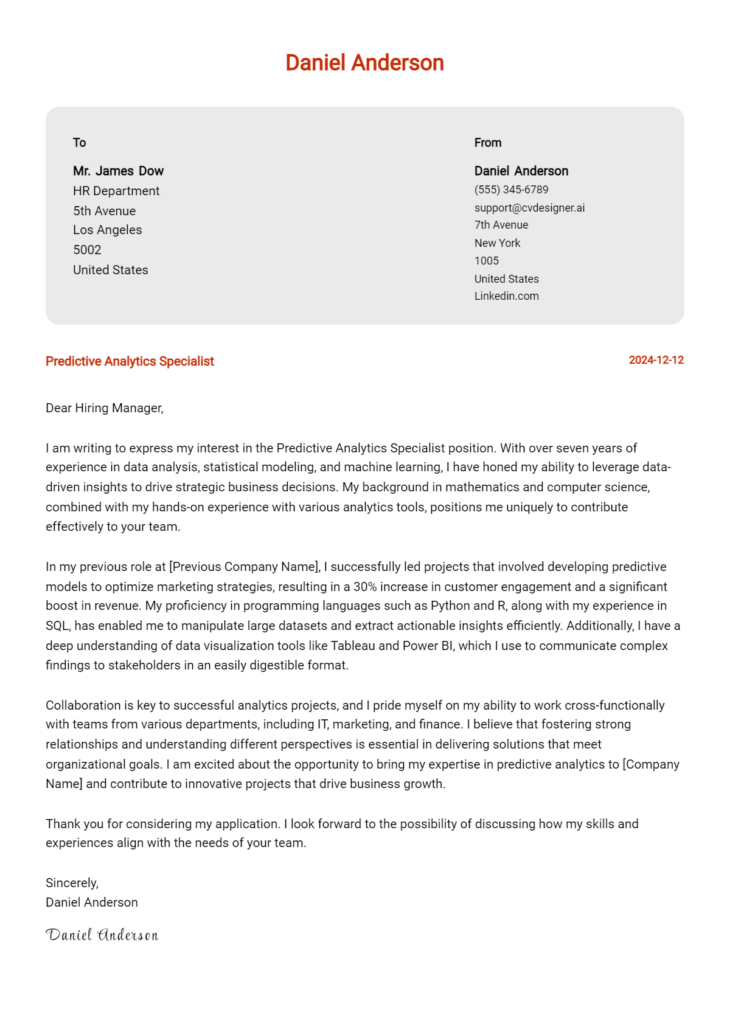Descriptive Analytics Specialist Cover Letter Examples
Explore additional Descriptive Analytics Specialist cover letter samples and guides and see what works for your level of experience or role.
How to Format a Descriptive Analytics Specialist Cover Letter?
Crafting a compelling cover letter for a Descriptive Analytics Specialist position is essential, as it not only showcases your qualifications but also reflects your analytical skills and attention to detail. The format of your cover letter can significantly impact how hiring managers perceive your candidacy, highlighting your ability to communicate complex data insights effectively. A well-structured cover letter will engage the reader while emphasizing your expertise in data analysis and your commitment to deriving actionable insights from data.
In this guide, we will explore the key components of a professional cover letter, offering tips and examples tailored for Descriptive Analytics Specialists.
We will focus on the essential elements, including:
- Cover Letter Header
- Cover Letter Greeting
- Cover Letter Introduction
- Cover Letter Body
- Cover Letter Closing
Each section is crucial for demonstrating your qualifications and professionalism. Let’s delve into the details of each part to help your cover letter stand out in the competitive field of analytics.
Importance of the Cover Letter Header for a Descriptive Analytics Specialist
A well-crafted cover letter header is crucial for making a strong first impression as a Descriptive Analytics Specialist. It serves as the introductory focal point of your application, providing essential information such as your contact details, the date, and the recipient's details. Clarity and professionalism in this section set the tone for the rest of the letter and signal your attention to detail—an important skill in analytics. A strong header ensures that your application is easily identifiable and accessible to hiring managers, while a weak header could lead to confusion or a lack of professionalism.
Strong Example
John Doe 123 Analytics Lane Data City, ST 12345 john.doe@email.com (123) 456-7890 October 1, 2023 Hiring Manager XYZ Analytics Firm 456 Market Street Data City, ST 12345
Weak Example
John Email: john@email.com (123) 456-7890 10/01/2023 To Whom It May Concern Company Name
The Importance of a Cover Letter Greeting
The greeting of your cover letter is crucial as it sets the tone for the rest of the letter. A well-crafted greeting not only demonstrates professionalism but also adds a personal touch by directly addressing the hiring manager. This connection can help you stand out in a competitive job market, particularly for a role like Descriptive Analytics Specialist, where attention to detail and communication skills are paramount. To achieve this, it's essential to avoid generic greetings that may come off as impersonal. Take the time to research the recipient's name, which can often be found on the company’s website or LinkedIn. This small effort can reflect your dedication and enthusiasm for the role.
Strong Example
Dear Ms. Johnson,
Weak Example
To Whom It May Concern,
The Importance of a Strong Cover Letter Introduction for a Descriptive Analytics Specialist
A well-crafted cover letter introduction is crucial for a Descriptive Analytics Specialist, as it serves as the first impression for the hiring manager. This opening paragraph needs to capture attention immediately, expressing genuine interest in the role while succinctly highlighting key skills and achievements that align with the job requirements. A compelling introduction sets the stage for the rest of the cover letter, encouraging the reader to delve deeper into the candidate's qualifications. Below are examples of both strong and weak cover letter introductions to illustrate this point.
Strong Example
Dear [Hiring Manager's Name], I am excited to apply for the Descriptive Analytics Specialist position at [Company Name], as I am passionate about transforming raw data into meaningful insights that drive strategic decisions. With over five years of experience in data analysis and visualization, I have successfully led projects that increased operational efficiency by 20% and enhanced customer satisfaction through targeted recommendations. My ability to communicate complex data insights clearly and effectively makes me a perfect fit for your team, and I am eager to contribute to [Company Name]'s mission of data-driven excellence.
Weak Example
To whom it may concern, I am writing to apply for the Descriptive Analytics Specialist position. I have some experience in analytics and think I could do a good job. I have worked with data and have used some tools, but I'm not sure how they relate to the specific needs at your company.
Purpose of the Cover Letter Body for a Descriptive Analytics Specialist
The cover letter body for a Descriptive Analytics Specialist serves to effectively highlight the candidate's relevant skills, experiences, and the unique value they can bring to the company. It is an opportunity to present specific projects or accomplishments that demonstrate the candidate's analytical capabilities and their impact on previous organizations. By detailing successful initiatives, such as the implementation of data visualization tools or the execution of complex data analysis projects that led to actionable insights, candidates can illustrate their potential contributions to future employers. A well-crafted cover letter body not only showcases technical expertise but also conveys a passion for data-driven decision-making.
Strong Example
I am excited to apply for the Descriptive Analytics Specialist position at XYZ Corporation, where I believe my skills in data analysis and visualization will add significant value. In my previous role at ABC Analytics, I led a project that analyzed customer purchasing behavior over two years, which resulted in a 15% increase in sales after implementing targeted marketing strategies. Additionally, I developed interactive dashboards using Tableau that enabled stakeholders to easily access and interpret key performance metrics. These experiences have honed my ability to translate complex data into actionable insights, making me a perfect fit for your team.
Weak Example
I want to apply for the Descriptive Analytics Specialist position at your company. I have done some data analysis before and I think I can help. I worked on a few projects that involved numbers, and I know how to use Excel. I feel like I would be a good candidate because I am interested in analytics and I want to learn more. Thank you for considering my application.
The Importance of a Strong Cover Letter Closing for a Descriptive Analytics Specialist
A well-crafted closing paragraph in your cover letter is crucial as it summarizes your qualifications, reiterates your enthusiasm for the role, and encourages the hiring manager to take the next steps, such as reviewing your resume or scheduling an interview. It should leave a lasting impression and convey your eagerness to contribute to the team. A strong closing encapsulates your skills and passion, while a weak closing may leave the reader unimpressed or uncertain about your fit for the position.
Strong Example
Thank you for considering my application for the Descriptive Analytics Specialist position. With my strong background in data analysis and visualization, coupled with my passion for transforming data into actionable insights, I am excited about the opportunity to contribute to your team. I am looking forward to discussing how my experience aligns with the goals of your organization. Please feel free to reach out to schedule an interview at your convenience. I have attached my resume for your review and hope to speak with you soon.
Weak Example
Thanks for reading my letter. I think I might be a good fit for the job. Let me know if you want to talk. I attached my resume.
These tips will assist candidates in crafting an effective cover letter for a Descriptive Analytics Specialist position. An impactful cover letter is crucial in highlighting your technical skills, problem-solving abilities, understanding of the Software Development Life Cycle (SDLC), teamwork experience, and a genuine passion for continuous learning in analytics. By focusing on these areas, you can create a compelling narrative that resonates with hiring managers.
Cover Letter Writing Tips for Descriptive Analytics Specialist
Showcase Your Technical Skills: Clearly outline your technical expertise, including proficiency in tools such as SQL, Python, R, and data visualization software like Tableau or Power BI. Mention specific projects where you utilized these skills to derive insights from data. This will demonstrate your ability to manage and analyze large datasets effectively.
Highlight Problem-Solving Abilities: Use examples from past experiences to illustrate your problem-solving capabilities. Describe a situation where you identified a data-related issue and how your analytical skills led to a solution. This not only shows your technical proficiency but also your ability to think critically under pressure.
Demonstrate SDLC Knowledge: Familiarity with the Software Development Life Cycle is essential for a Descriptive Analytics Specialist. Mention any experience you have working on projects through various SDLC phases. Explain how you have collaborated with cross-functional teams to ensure data quality and project success, emphasizing your understanding of the importance of each phase in the process.
Emphasize Teamwork: Analytics often involves collaboration with different stakeholders. Highlight experiences where you worked effectively within a team to achieve a common goal. Describe how you communicated insights to non-technical team members and contributed to group efforts, showcasing your interpersonal skills as well as your analytical prowess.
Express a Passion for Continuous Learning: The field of data analytics is ever-evolving, so demonstrating a commitment to ongoing education is vital. Mention any certifications, online courses, or workshops you have completed recently. Discuss your eagerness to stay updated with industry trends and technologies, which will further reinforce your dedication to the field.
For more guidance on crafting your cover letter, consider using cover letter templates or a cover letter builder to streamline the process and ensure a professional presentation.
Common Mistakes to Avoid in a Descriptive Analytics Specialist Cover Letter
Avoiding common mistakes in your cover letter is crucial for making a strong impression as a Descriptive Analytics Specialist. A well-crafted cover letter can highlight your analytical skills and relevant experience, while errors can detract from your qualifications. Here are some common pitfalls to avoid:
Generic Content: Tailoring your cover letter to the specific job and company is essential. Avoid using a one-size-fits-all approach. Research the company and mention how your skills align with their needs.
Lack of Specificity: Failing to provide concrete examples of your achievements can weaken your application. Instead of vague statements, include specific metrics or projects that demonstrate your analytical expertise.
Ignoring Formatting Guidelines: Neglecting proper cover letter format can detract from your professionalism. Follow established cover letter format standards to ensure clarity and readability.
Overly Complex Language: Using jargon or overly technical language can alienate your reader. Write clearly and concisely to communicate your qualifications effectively without overwhelming the hiring manager.
Typos and Grammatical Errors: These mistakes can undermine your credibility and attention to detail. Always proofread your cover letter and consider using tools or getting a second pair of eyes on it.
Failing to Highlight Soft Skills: While technical skills are crucial, don't forget to emphasize your teamwork, communication, and problem-solving abilities. These soft skills are vital in a collaborative analytics environment.
Neglecting a Call to Action: Concluding without a strong call to action can leave your cover letter feeling incomplete. Express your eagerness to discuss your qualifications further and include your contact information.
By steering clear of these common mistakes and utilizing resources like cover letter examples, you can craft a compelling cover letter that stands out to employers.
Cover Letter FAQs for Descriptive Analytics Specialist
What should I include in my cover letter for a Descriptive Analytics Specialist position?
In your cover letter, it's essential to highlight your analytical skills and experience with data interpretation. Begin with a strong introduction that mentions the specific position you are applying for and where you found the job listing. Detail your technical skills, such as proficiency in tools like SQL, Python, or Tableau, along with any relevant statistical methods you are familiar with. Include examples of past projects where you successfully analyzed data to derive actionable insights that benefited your previous employers. Lastly, express your enthusiasm for the role and the company, emphasizing how your skills align with their goals.
How can I showcase my analytical skills in my cover letter?
To effectively showcase your analytical skills, provide concrete examples from your previous experience. Instead of simply stating that you have strong data analysis abilities, describe specific projects where you utilized these skills. For instance, you might mention a project where you analyzed customer behavior data to improve marketing strategies, leading to a measurable increase in customer engagement. Use quantitative results wherever possible, such as “increased sales by 15% through data-driven recommendations.” This not only demonstrates your capabilities but also provides a narrative that highlights your impact in previous roles.
Should I customize my cover letter for each application?
Absolutely! Customizing your cover letter for each application is crucial for standing out in a competitive job market. Tailor your content to reflect the specific requirements of the Descriptive Analytics Specialist role you are applying for. Research the company’s values, goals, and recent projects, and incorporate this information into your letter. Mention how your background aligns with their objectives and how you can contribute to their success. A personalized cover letter shows genuine interest in the position and helps you connect your skills directly to the needs of the employer.
How long should my cover letter be?
Your cover letter should ideally be one page long, consisting of three to four paragraphs. This length allows you to provide a concise overview of your qualifications without overwhelming the reader. Aim for around 300 to 400 words, focusing on key points that highlight your analytical skills, relevant experience, and enthusiasm for the role. Be sure to maintain a professional tone and clear structure, making it easy for hiring managers to skim for essential information. A well-organized cover letter that respects the reader's time can make a positive impression.
Build your Cover Letter in minutes
Use an AI-powered cover letter builder and have your letter done in 5 minutes. Just select your template and our software will guide you through the process.

